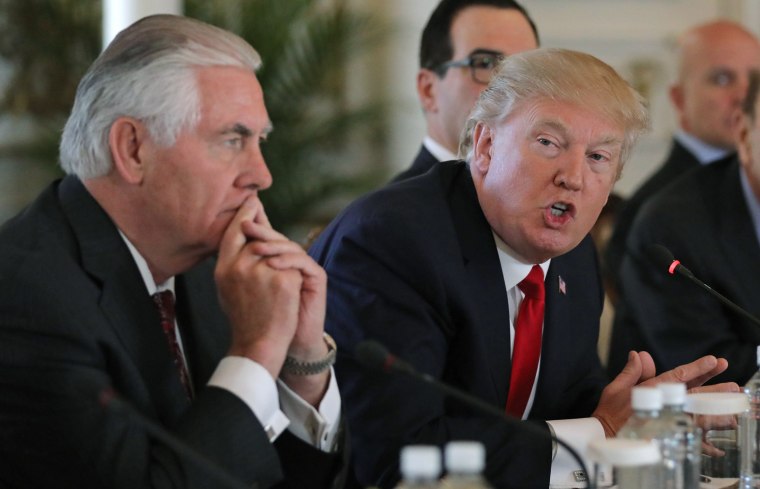President Donald Trump reversed his stance on NATO being "obsolete" Wednesday — a 180-degree turn on a key campaign complaint that the military alliance was no longer equipped for the fights ahead, specifically when it comes to terrorism.
During a joint press conference with NATO Secretary General Stoltenberg, Trump said NATO "is no longer obsolete" because it has adapted to focus on handling the threat of terror.
The president called NATO a "bulwark of international peace and security."
As a candidate Trump complained repeatedly about fellow member states not paying their fair share. The agreed upon amount is at least 2 percent of a country's GDP, but less than a quarter of the 28 countries in the alliance are actually contributing that.
"NATO is obsolete," Trump, then a candidate, told ABC News in March of 2016. "And it's extremely expensive to the United States, disproportionately so. And we should readjust NATO. And it's going to have to be either readjusted to take care of terrorism or we're going to have to set up a new -- a new coalition, a new group of countries to handle terrorism because terrorism is out of control."
On Wednesday, the NATO secretary general agreed that other allied nations needed to pay more, telling reporters at the press conference that all nations need to contribute their fair share in the name of security.
Germany, for instance, has committed to ratcheting up its spending to 2 percent of GDP by 2024, a decision Trump praised Merkel for during a joint press conference at the White House last month.
President Trump also weighed in on Secretary of State Tillerson's meeting with Russian President Vladimir Putin and Foreign Minister Sergei Lavrov, saying Tillerson did a "terrific job" but that time will tell on the meeting's outcome.
Trump maintained, as he did for the entirety of his candidacy, that it would be good for the U.S. to have better relations with Russia but as it stands right now "we're not getting along with them at all."
He went on to say that relations between the two countries "may be at all time low."
Trump also had harsh words for Syrian President Bashar al-Assad, saying he has "absolutely no doubt" the U.S. did the right thing with a military strike he ordered over the weekend.
Trump denounced the Syrian strongman in no uncertain terms, saying his regime's chemical weapons attack proves "that's a butcher. That's a butcher."
Senior administration officials said before the meeting and joint press conference that NATO defense spending, combating terrorism, and Russian involvement in Crimea were all likely topics of discussion.
Wednesday's meeting was the first in-person encounter for these leaders, but not their first time speaking.
The two men spoke by phone during Trump's transition and "both underlined NATO's enduring importance, and discussed how NATO is adapting to the new security environment, including to counter the threat of terrorism," according to a NATO readout of the call. They also agreed that shared burden of defense spending by other NATO countries was an issue, and that "progress has been made on fairer burden-sharing, but that there is more to do."

